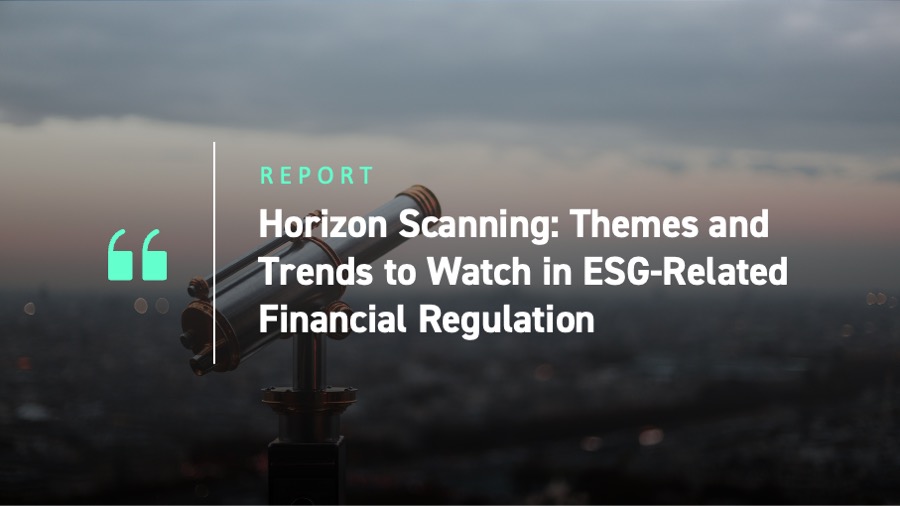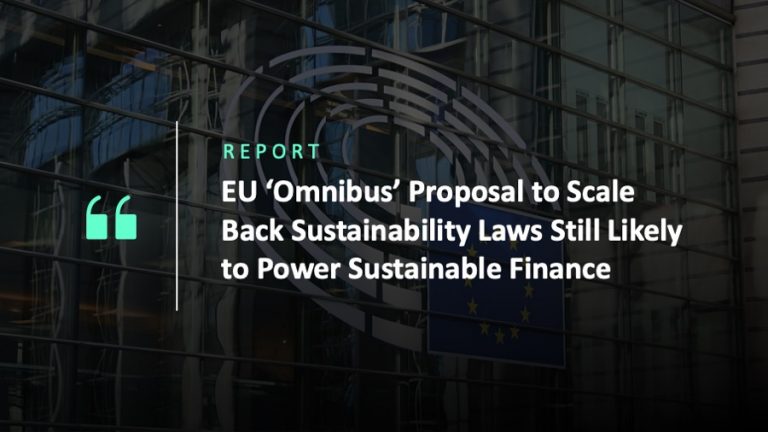This post is an excerpt from the forthcoming 2024 Global Regulatory Update: Recent Developments and Key Themes in ESG-Related Regulations Globally, to be released later this month. The full report will review other anticipated themes and trends in ESG-related finance regulation, along with other aspects of ESG regulation.
The approaching end of 2024 provides an opportunity to review some of the emerging and anticipated trends in ESG-related financial regulation globally. Sustainable finance regulation continues to develop, as securities regulators set supervisory priorities and identify regulatory goals beyond the initial building blocks of corporate and investor sustainability-related disclosure.
This post outlines some trends to watch this year and into 2025:
Towards a Green Transition: The Next Wave of Sustainability Reporting
In 2024, some began to identify “transition” investing as the new “ESG” investing. A focus on the green transition and its implications for corporate reporting and investing considerations is not a new development. What is notable, however, is the breadth and granularity of anticipated and potential reporting obligations related to the green transition. These obligations cover a range of financial market participants and investment products:
- ISSB has now assumed responsibility for U.K. Transition Plan Taskforce (TPT) disclosure materials. This means that the TPT disclosure framework will become a global “gold standard,” covering the real-economy and financial sectors. The new ISSB responsibility also sets the market expectation that IFRS S2 updates will rely on the TPT materials. This, in turn, places the ISSB in a position to consolidate and help standardize disclosures about transition plans.
- The U.K. government is expected to mandate transition plan reporting for FTSE 100 companies and U.K.-regulated financial institutions, which would include market participants such as pension funds, asset managers, banks, and insurers.
- In the EU, the European Financial Reporting Advisory Group (EFRAG), an advisory body to the European Commission that provides technical advice on draft European Sustainability Reporting Standards (ESRS), is working on draft implementation guidance focusing on transition planning. Also, the EU Platform on Sustainable Finance, another advisory group to the European Commission, may publish recommendations on transition plans for the financial sector, which may overlap with EU Green Taxonomy mapping.
- The European Securities and Markets Authority (ESMA) released a report in July 2024 setting out its long-term vision on the functioning of the EU Sustainable Finance Regulatory Framework. In the report, ESMA advocated for including a definition of “transition investments” within the framework, both for legal clarity and to support the creation of transition-related products. ESMA similarly called for greater reporting by the financial sector on transition planning and finance; a broader set of transition benchmarks; and a general product categorization system, such as EU labels for transition bonds, based on clear eligibility criteria and binding transparency obligations; as well as reporting on the share of revenue and capital expenditure linked to “harmful activities that are in a transitioning trajectory or are decommissioning.”
Transition planning reporting will not be immune from the prospect of diverging corporate reporting standards. Jurisdiction-by-jurisdiction tailoring of the ISSB standards to local markets, based on local economies and political considerations, and the EU’s double materiality approach make reporting convergence unlikely. Nevertheless, given the commonalities among different sustainability reporting standards such as CSRD and those based on ISSB, regional divergences need not prevent transition planning reporting from being anchored in a comparable baseline.
Policymakers Take Steps to Define “Greenwashing” in Action
Combatting “greenwashing” has emerged as one of the key preoccupations of securities regulators and policymakers. This has brought supervisory action in various contexts, covering the gamut of financial market participants and investment products.
Some supervisors have leaned on their existing enforcement authority while others have introduced measures to specifically address greenwashing. Recent enforcement decisions and claims reflect the range of familiar regulatory pressures and new lines of regulatory enforcement.
In the EU and the United Kingdom, supervisory authorities have often treated greenwashing as a distinct issue that requires explicit rules:
- The European Supervisory Authorities (ESAs), comprising the ESMA, the European Banking Authority (EBA), and the European Insurance and Occupational Pensions Authority (EIOPA), published their final report on greenwashing in June 2024, having set out a broad definition for greenwashing that encompasses statements, declarations, actions, or communications that do not “clearly and fairly” reflect the underlying sustainability profile of an entity, financial product, or service, irrespective of whether or not they are made intentionally. The ESAs identify multiple points in the investment chain (e.g., issuers, investment managers, service providers) where greenwashing can occur. ESMA specifically identifies the following categories as high-risk areas for greenwashing: ESG strategy, objectives, and characteristics; governance and resources related to sustainability considerations; ESG labels and qualifications; impact claims; sustainability metrics and targets; and pledges about future ESG performance (e.g., ESG targets, transition plans).
- In the United Kingdom, the Financial Conduct Authority (FCA) introduced an anti-greenwashing rule alongside the U.K.’s Sustainability Disclosure Regime (SDR). The rule became effective May 31, 2024. The rule extends to social-washing (misleading claims about social responsibilities) and covers a range of communications, such as statements, strategies, policies, and images relating to a product or a service. The FCA also suggests that the claims should comply with the anti-greenwashing rule on an ongoing basis.
In other jurisdictions, supervisory authorities have used their existing powers to intervene in cases of greenwashing:
- During the 15 months leading up to June 30, 2024, the Australian Securities & Investments Commission (ASIC) made no fewer than 47 interventions to address greenwashing misconduct. These interventions have included two Federal Court proceedings and a further 37 enforcement actions related to correcting sustainability-related claims and disclosures by various entities. Most recently, the Federal Court imposed a $12.9 million penalty, the highest yet in Australia for greenwashing conduct, on a fund manager for making misleading claims about environmental, social, and governance (ESG) exclusionary screens.
- In the United States, the Securities and Exchange Commission (SEC) charged a company with making inaccurate statements in its annual reports regarding the recyclability of one of its products. The company agreed to pay a civil penalty of $1.5 million.
Canada has adopted greenwashing regulation that stands apart in its comprehensiveness and enforcement reach. The Federal Government amended the Competition Act in June 2024 to require all Canadian companies (not just financial ones) to test or substantiate, in accordance with an internationally recognized methodology, environmental claims about their business or products. Further, the Act allows greenwashing claims to be brought forward by private parties, starting June 2025. Penalties under the amended Act are severe and can amount to up to C$10 million, or 3% of worldwide gross revenues. The Canadian Competition Bureau recently consulted on how to enforce the new provisions.
For more on themes and trends in ESG-related finance regulation, see the forthcoming 2024 Global Regulatory Update.
Explore ISS ESG solutions mentioned in this report:
- Financial market participants across the world face increasing transparency and disclosure requirements regarding their investments and investment decision-making processes. Let the deep and long-standing expertise of the ISS ESG Regulatory Solutions team help you navigate the complexities of global ESG regulations.
- Use ISS ESG Climate Solutions to help you gain a better understanding of your exposure to climate-related risks and use the insights to safeguard your investment portfolios.
- Identify ESG risks and seize investment opportunities with the ISS ESG Corporate Rating.
- Assess companies’ adherence to international norms on human rights, labor standards, environmental protection and anti-corruption using ISS ESG Norm-Based Research.
By:
Karina Karakulova, Head, Regulatory Affairs & Public Policy, ISS STOXX
Hugo Gallagher, Senior Associate, Regulatory Affairs & Public Policy, ISS STOXX




